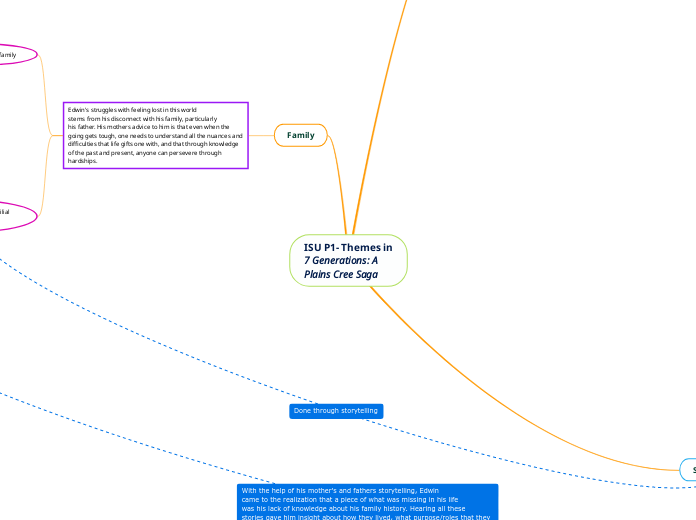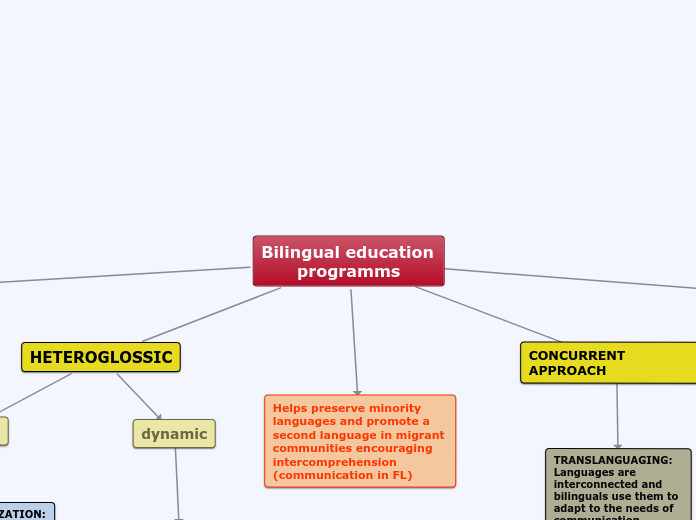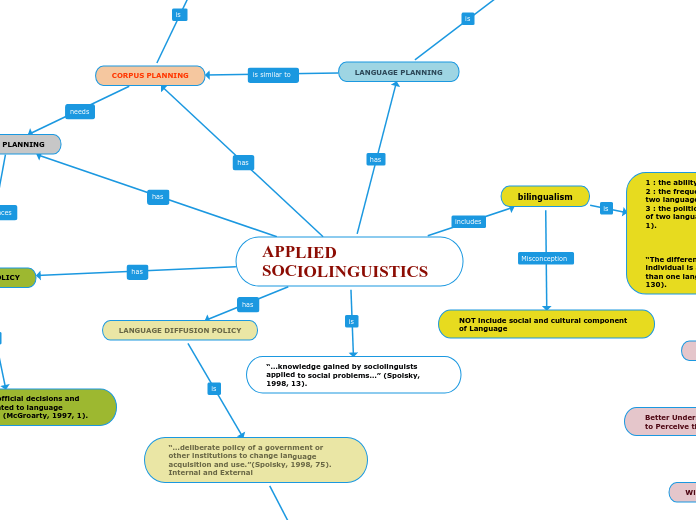ISU P1- Themes in
7 Generations: A
Plains Cree Saga
Family
Edwin's struggles with feeling lost in this world
stems from his disconnect with his family, particularly
his father. His mothers advice to him is that even when the going gets tough, one needs to understand all the nuances and difficulties that life gifts one with, and that through knowledge of the past and present, anyone can persevere through hardships.
Reconnecting with tradition/ familial
values
Reconnecting with family
At the very end of the novel, James makes the decision to find his own way through life, just as he has been this whole time. Only now, he has acknowledged that he needs to heal instead of build up resentment. He says that "the elders say what was done to us will touch us for 7 generations. So, too, the healing we do now will mend our people over that time" (pg. 126). Edwin has decided to break the cycle and find his own walk of life to take, one that will lead him to find his destiny. When they depart, the amulet is given back to his dad as a sign of forgiveness and peace between the two.
Paints a picture of intergenerational trauma: Parallels are shown between Edwin's and James' stories. James has scars from going through the residential school system and watching his brother die trying to escape, while his son has scars because he grew up without a father and felt resentment towards him for leaving. Both are deeply troubling issues that essentially stem from the same place (how Indigenous peoples and their issues are treated in this country), which goes to show how the cycle doesn't end until somebody decides to break it and heal.
During this visit, James vocalizes lots of negative
thoughts/ feelings towards his father for being absent.
His father then gets to explain to him why he left all
those years ago. Lasting trauma from his experience at
residential schools was what made him an unsuitable
parent. James was under the impression that if he left,
he could heal his demons and potentially come back to
be a great father to his son.
In the last chapter of the book, Edwin is seen taking
charge of his own life and going to meet with the
very person responsible for making him feel
like he is living without a purpose; his father James.
Storytelling and Healing
At the very beginning of the novel, we are
introduced to the protagonist Edwin, who has
recently survived a suicide attempt. As the novel
progresses, Edwin is seen partaking on a journey
to heal himself. He does this in different ways, with
the most significant being his listening to the stories
of his ancestors, which is told by his mother.
The Amulet of Destiny
(example amulet)
In the end, Edwin decided to give his father back the amulet, because he believes that James needs it more than he does. He has been carrying this trauma first and for longer, so it is only fair that he is reminded that his destiny and fate does not lie in miserable affairs of the past. Edwin tells his father what his mother told him: "When mom gave it to me, she told me it had the power to heal, to help me on my journey. I want you to have this as you continue on your journey" (pg. 127). What Edwin is trying to say here is that he forgives his father now that he understands his perspective, and why he had to leave him all those years ago. Only through the use of storytelling could Edwin have gained this perspective, and decided what to do about the major problems in his life.
*regarding the returning of the amulet
"But your walk... this is yours."
"I'm going to find my own". (pg. 127)
"What happened to you doesn't define you. You
define you. We are not our yesterday. We are our
today, our tomorrow". (pg. 126)
At the beginning of Stone, we are introduced to this blue necklace given to Stone by an elder in his community after he completes his vision quest. This amulet is said to be a physical reminder of what was seen during the vision quest, and has the potential to unlock his destiny. The amulet is passed down through many generations, as we see it going from Stone --> White Cloud --> James --> Edwin. Whenever there is a desire to keep the legacy of the past generations alive, someone passes down this amulet as well as the story of it. This is just one of many examples of how storytelling heals, and how the journey of figuring out how to navigate life feels less lonely when you know there are people out there who are on the same path as you. Throughout the whole novel for example, these people would be your ancestors who all have different stories of individual hardships, and have succeeded in the end, persevering despite everything that was in their way.
Indigenous History and Past Events
Since the timeline of the story spans over
three generations, we are introduced to both a
variety of cultural events practiced by Plains Cree
Nations, as well as systemic issues faced by
Indigenous peoples.
Ways of life: Plains Cree warriors
Vision quest: A vision quest appears to be a ritual or ceremony practised by Indigenous tribes like the Plains Cree (depicted in the novel). The participant has to leave home for a few days, and not eat or sleep during this time to induce hallucinations. These are called visions, and are said to connect the participant with the Creator so that they will be shown their destiny.
"There are no accidents Stone. The vision was
your past and your future". (pg. 12)
Plains Cree buffalo hunting:
After his brother Bear dies, Stone embarks
on a Buffalo hunt with an elder.
The elder tells him "You did well, Stone. You are
ready." (pg. 25), which indicates it was time to honour
the promise he made to Bear about becoming a Brave.
"Promise this: you will dance to become a brave."
"I promise". (pg. 15)
Thirst Dance: Dancers danced for days without food or water, to honour a higher being known as the Great Spirit. Stone's final test is done by performing a selective dance in order to become a "Brave", and join the warriors of his tribe. He has to dance backwards while connected to a pole with rope around it to rip out the needles (secured by the same rope) which are stuck inside his skin. Following through with this incredibly painful event shows bravery and loyalty to the tribe, which are two important makings of a warrior.
"It was Stone's last trial to join the warrior society." (pg. 27)
Residential schools
Residential schools were a way for the Canadian government
to systematically oppress and undermine Indigenous cultures. They were introduced as a way to assimilate impressionable Indigenous children into British Catholic/Christian society, as the way they were living was not up to "Western standards". These schools spread across Canada rapidly, and became mandatory for all children to attend around the 19th and 20th century. In these schools, children were not allowed to practice anything pertaining to cultural, speak their mother-tongue, or go about any aspect of their lives in a traditional way. If these conditions were not met, children were forced to endure cruel punishments of physical, sexual, and psychological abuse. The conditions suffered at these schools were so bad that many children died attending them. The harrowing, traumatic events experienced by these children still leave deep scars within many Indigenous communities, and the effects of residential schools continue to haunt the future generations.
The lasting trauma from witnessing the horrors of
residential school firsthand has cause James to be
absent in his son's life. James turned to alcohol in
attempts to numb the pain instead of processing it.
A specific traumatic example would be watching
his brother get beat and whipped at school. This had resurfaced in the future when James got frustrated with baby Edwin and unconsciously wanted to channel his anger by striking Edwin. This close call resulted in his wife telling him that he is unfit for being Edwin's father right now.
"But you need to deal with the demons that haunt you
before you can be a father to him. You need to
heal yourself. You need to forgive yourself". (pg. 105)
"The sound of snapping leather, like clapping hands,
then whimpers from my brother. Pleading for mercy.
I still feel the rage". (pg. 91)
James attended residential school from a young age, alongside his brother Thomas. We see the brothers first coming into the schools not knowing what to expect. As time passes however, they are punished by their teachers and priests time and time again, conditioned to stray
further from their traditional beliefs throughout the novel.
"Through all of this, he tried to learn and obey
them, like I told him. But they taught him from
their disdain for us, a place of contempt for
our people and our ways". (pg. 89)
"I went to school, but what did I learn? Seems
like I unlearned things". (pg. 80)
"The first thing they did was cut off our hair.
It was too Indian.... Pretty soon we looked like Whites, except,
you know, for the brown they couldn't scrub
away". (pg. 76)
James narrates:
"Soon we learned that we weren't
supposed to speak our language,
either... He said we'd go to hell if we did".
...
"I'll not hear that devil's tongue again.
Do you understand?". (pg. 75)
Smallpox pandemic
The smallpox pandemic was introduced to the residents of
turtle island through first European contact. In the 1700s, European settlers gifted blankets to a Native American community. Having no natural defence mechanism, they were unable to fight this disease without dying. Although the blankets were originally given to one tribe, smallpox slowly spread across the land for a century through trade and raiding other tribes good's. The disease spread onto Edwin's ancestors, tragically killing everyone it touched.
At the end of the story, the only remaining member
of the family encampment was the young White Cloud, another one of Edwin's ancestors. His family has all died
from the disease, and he is left with no choice to abandon
the encampment to go find shelter elsewhere. White Cloud has his doubts about being able to find his way without any guidance from his elders, and is about to give up. He doesn't want to leave everyone there. But just before he loses all semblance of hope, White Cloud reencounters a cousin of his, who does not appear to be infected. By not entirely losing all hope in dark times, White Cloud was able to learn that sometimes we need to leave things behind to clear space for the path in front.
"You can survive."
"I don't know where to go."
"You will find your way". (pg. 45)
"You are the last of us, White Cloud. You
are stronger than you know."
"I should have stayed with my brother. I
left him there to die."
"He loves you enough to let you go, my son".
(pg. 58)









